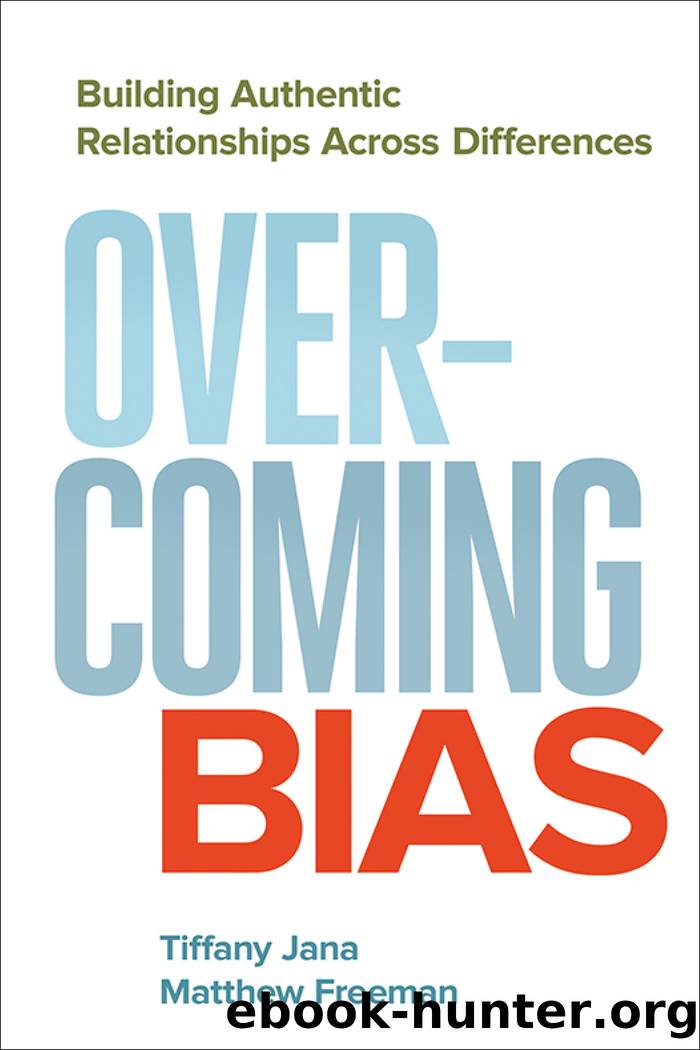Overcoming Bias by Tiffany Jana

Author:Tiffany Jana
Language: eng
Format: epub
Publisher: Berrett-Koehler Publishers
Published: 2016-06-15T00:00:00+00:00
I then asked the students to think about, if these folks were on the margins of society, who were the corresponding groups that we might think of as being in the âcenter.â Their list:
Marginalized Groups
Center
1. People of color
1. White people
2. Women
2. Men
3. People with disabilities
3. Able-bodied people
4. People in poverty
4. People not in poverty
5. LGBT people
5. Heterosexuals
6. Non-Christians
6. Christians
7. Immigrants
7. Natural-born US citizens
I then asked a question that took some courage on my part given how emotionally and politically fraught conversations about privilege are, even though its answer is fairly obvious. I asked the students to think about me, their guest lecturer, and point out which categories I fell into in the marginalized groups vs. the center. Visually obvious to them was that I was a white, able-bodied man who did not appear to be in poverty by virtue of my clothing and appearance as a guest lecturer visiting from another state. Obvious from my stories was that I was born in the United States, into a Christian family, and that I was married to a woman. There was not a single one of these examples in which I fell into a category that is marginalized in twenty-first-century America. I asked the students if my privilege was my choice. Looking at these categories, their answers were âof course not.â
From this list, there are arguably only two categories that might be considered some kind of choice. One is religion, the other, wealth. It is worth pointing out, however, that both religion and socioeconomic status are not a choice when you are a child. These early influences are dictated by the choices and circumstances of whoever raised you. Nevertheless, I used this exercise as a launchpad to talk about my experiments in choosing voluntary poverty, in part as an attempt to make the choice to give up some privilege and live in solidarity with people who are often marginalized and ignored.
But can you actually give up privilege? Well, you canât change your skin color, but you can change your socioeconomic status and choose poverty. Dorothy Day, the founder of the Catholic Worker Movement, once said, âI condemn poverty and I advocate it; poverty is simple and complex at once; it is a social phenomenon and a personal matter.â1 Voluntary poverty is very different from involuntary poverty, and the two should not be confused. For centuries, Buddhist monks, Catholic nuns, and utopian communalists have embraced voluntary poverty as a way to free themselves from the demands of material society to pursue enlightenment. Dorothy Day and the Catholic Workers inspired by her embrace voluntary poverty for an additional reason: as a means to bridge the divide in experience between those who are poor and those who are not. Day said voluntary poverty âmeans nonparticipation in those comforts and luxuries which have been manufactured by the exploitation of others . . . while our brothers [and sisters] suffer from lack of necessities, we will refuse to enjoy comforts.â2 Matthew was so intrigued by this notion, and inspired by Dayâs example, he decided to try living in voluntary poverty.
Download
This site does not store any files on its server. We only index and link to content provided by other sites. Please contact the content providers to delete copyright contents if any and email us, we'll remove relevant links or contents immediately.
| Conflict Resolution & Mediation | Human Resources & Personnel Management |
| Knowledge Capital | Outsourcing |
Bullshit Jobs by David Graeber(4190)
Radical Candor by Kim Scott(2723)
I Am Right, You Are Wrong by Edward De Bono(2441)
23:27 by H. L. Roberts(2249)
Nomadland by Jessica Bruder(2063)
Average Is Over by Tyler Cowen(1848)
The Conflict Resolution Phrase Book by Barbara Mitchell & Cornelia Gamlem(1779)
Out of Our Minds: Learning to Be Creative by Ken Robinson(1745)
High-Impact Interview Questions by Victoria A. Hoevemeyer(1691)
Who Moved My Cheese?: An Amazing Way to Deal With Change in Your Work and in Your Life by Johnson Spencer(1648)
An Everyone Culture: Becoming a Deliberately Developmental Organization by Robert Kegan & Lisa Laskow Lahey(1644)
The Ideal Team Player by Patrick M. Lencioni(1642)
The Asshole Survival Guide by Robert I. Sutton(1598)
Automatic Society by Bernard Stiegler(1556)
Unleashed by Anne Morriss & Frances Frei(1540)
Who by Street Randy & Smart Geoff(1506)
42 Rules of Employee Engagement by Susan Stamm(1477)
96 Great Interview Questions to Ask Before You Hire by Paul Falcone(1452)
Fish! by Stephen C. Lundin(1405)
